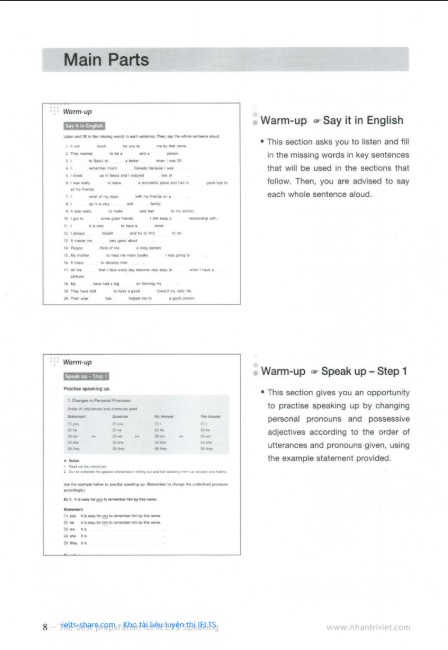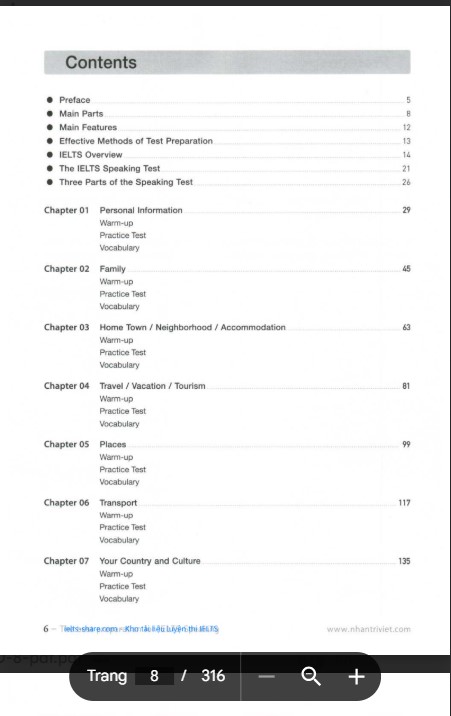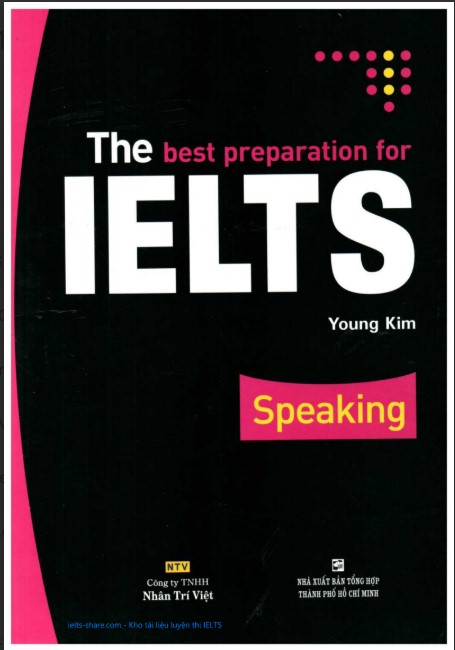The best preparation for IELTS Speaking
Young Kim
NTV công ty tnhh nhân trí việt
nhà xuất bản tổng hợp thành phố hồ chí minh



Contents
preface ………………………………………………………………………….. 5
main parts ……………………………………………………………………… 8
main features ………………………………………………………………….. 12
effective methods of test preparation ……………………………………… 13
ielts overview …………………………………………………………………… 14
the ielts speaking test ……………………………………………………….. 21
three parts of the speaking test …………………………………………… 26
chapter 01 personal information …………………………………………… 29
warm-up
practice test
vocabulary
chapter 02 family ………………………………………………………………… 45
warm-up
practice test
vocabulary
chapter 03 home town / neighborhood / accommodation ………………. 63
warm-up
practice test
vocabulary
chapter 04 travel / vacation / tourism ……………………………………. 81
warm-up
practice test
vocabulary
chapter 05 places ……………………………………………………………… 99
warm-up
practice test
vocabulary
chapter 06 transport ………………………………………………………….. 117
warm-up
practice test
vocabulary
chapter 07 your country and culture ……………………………………. 135
warm-up
practice test
vocabulary
chapter 08 communication ………………………………………………… 155
warm-up
practice test
vocabulary
chapter 09 people ……………………………………………………………. 171
warm-up
practice test
vocabulary
chapter 10 environment …………………………………………………… 189
warm-up
practice test
vocabulary
chapter 11 animals / pets ………………………………………………….. 207
warm-up
practice test
vocabulary
chapter 12 food ……………………………………………………………….. 225
warm-up
practice test
vocabulary
chapter 13 interest / hobby / free time ………………………………. 243
warm-up
practice test
vocabulary
chapter 14 sports / health …………………………………………………. 259
warm-up
practice test
vocabulary
chapter 15 tv / movies ……………………………………………………… 275
warm-up
practice test
vocabulary
answers ……………………………………………………………………….. 291
speak up – step 1 model answers
part 3 more questions & model answers
Main Parts
(Hình ảnh Warm-up – Say it in English)
Warm-up – say it in english
listen and fill in the missing words in each sentence. then, say the whole sentence aloud.
- it will much for you to are by their name.
- i worked a a father when i was 20.
- i lived in seoul and i moved to
- my friends to leave a secluded place and had to good-bye to
- i could with my friends at my
- my friends and family.
- it is always to make and feel to my school.
- i have many friends to keep a strong relationship with.
- it is very to have a mind.
- it makes me very good about
- i think of my person.
- my father to be an honest person i was going to
- it always my day becomes very easy to when i have a
- have had a big on turning my
- they have to have a good toward my daily life.
- then also has toward me to a good person.
Warm-up – say it in english
- this section asks you to listen and fill in the missing words in sections that will be used in the sections that follow. then, you are advised to say each whole sentence aloud.
(Hình ảnh Warm-up – Speak up – Step 1)
Warm-up – speak up – step 1
practice speaking up.
- changes in personal pronouns
order of utterances and pronouns used
statement question yes answer no answer - i like he he
- do you he yes he
- he is she he
- she has he he
- i am she he
- he has it he
- it is she he
- she has they he
- they are my they they
- we are your we we
- you are my you you
- i do they he
- she is he he
- he is she he
- he is he he
- they are we he
- we are he he
- you are i he
- i have she he
- he has he he
- notes
read out the utterances.
use the example letter to practice speaking up. remember to change the underlined pronouns accordingly.
do use the example letter to practice speaking up. remember to change the underlined pronouns accordingly.
statement it is easy for you to remember him by his name.
question is it easy for you to remember him by his name.
yes answer yes it is.
no answer no it is not.
statement my father is my hero.
question is your father your hero.
yes answer yes he is.
no answer no he is not.
Warm-up – speak up – step 1
- this section gives you an opportunity to practice speaking up by changing personal pronouns and possessive adjectives according to the order of utterances and pronouns given, using the example statement provided.
Warm-up – speak up – step 2
practice speaking up.
- changes in personal pronouns
order of utterances and pronouns used
statement question yes answer no answer - i like he he
- do you he yes he
- he is she he
- she has he he
- i am she he
- he has it he
- it is she he
- she has they he
- they are my they they
- we are your we we
- you are my you you
- i do they he
- she is he he
- he is she he
- he is he he
- they are we he
- we are he he
- you are i he
- i have she he
- he has he he
- no changes in personal pronouns
order of utterance question no answer yes answer - i like i i
- do you i yes i
- he is he yes he
- she has she yes she
- i am i yes i
- he has it yes it
- it is it yes it
- she has they yes they
- they are they yes they
- we are we yes we
- you are you yes you
- i do i yes i
- she is she yes she
- he is he yes he
- he is he yes he
- they are we yes we
- we are we yes we
- you are i yes i
- i have i yes i
- he has he yes he
- notes
- read out each statement.
- memorize it and do not turn it in again.
- use the sentences according to the order mentioned above, and then speak up your sentences naturally and fluently.
use the examples better to practice speaking up. (remember to follow the order mentioned above and change the underlined pronouns and possessive adjectives accordingly, if necessary.)
- it is easy for you to remember him by his name.
- my parents have always been a loving person.
- ho chi minh city is the best place to get a better job when i was 20 years old.
- i sometimes have a fantastic about them. it is true that one day they may have a…
Warm-up – speak up – step 2
- in this section, you will use the 20 statements given to practise speaking up by following the order mentioned and changing the underlined pronouns and possessive adjectives accordingly.
(Hình ảnh Practice Test – Part 1)
Practice Test – Part 1
question 1
what is your name?
personal answer
standard answer
my name is ly ly. my friends call me ly ly because i speak english well. please call me ly ly.
advanced answer
my surname is ly. my full name is ly ly. my friends call me ly ly because i speak english well and i want to be an english teacher in the future. so, please call me ly ly.
question 2
what does your name mean?
personal answer
Practice Test – Part 1
- five typical questions in part 1 of the ielts speaking test are given. you are asked to think of your personal answer to each of these questions and say it aloud.
- lower-level learners may look at standard answers, whereas higher-level ones may employ advanced answers as sample answers.
Practice Test – Part 2
Topic Card 2
describe your personality.
you should say:
what kind of person you think you are
what you family and friends think about your personality
is your personality special
and how your personality affects your life.
personal answer
standard answer
i think i am a very happy person. i have many friends and i always stay busy. my parents and my friends think i am a very outgoing person. i really enjoy meeting new people and i also like helping others. it makes me feel very good. my pen friend who lives in korea is a very interesting person, and that makes me very special. i think it is very important to have a healthy idea.
Practice Test – Part 2
- two typical topic-card questions in part 2 of the ielts speaking test are given. you are asked to think of your personal answer on the points listed for 1-2 minutes.
- lower-level learners may look at standard answers, whereas higher-level ones may employ advanced answers as sample answers.
Practice Test – Part 3
question 3
how do you like your personality?
suggested input
positive personality
genuine, charming, considerate, courageous, honest, generous, optimistic, organized, reasonable, understandable
negative personality
aggression, arrogant, bossy, cowardly, dishonest, irresponsible, pessimistic, fussy.
personal answer
model answer
Practice Test – Part 3
- five typical questions in part 3 of the ielts speaking test are given. you are asked to think of your personal answer to each of these questions and say it aloud.
- you may use the suggested input below each question in this part to prepare for your own answer.
- in addition to these five questions, more questions are provided for your further speaking practice.
Vocabulary
| Term | Related Words |
| nickname | coachman |
| be similar to | romantic |
| be composed of | respected |
| a to b | attitude |
| be raised | direct |
| capital | offend |
| headquarters | presume |
| convenient | impact |
| grow up | form |
| spring | functional |
| playground | share something in common |
| castle | complement |
| catch and seek | shape |
| rough | duty |
| transfer (n.) | trauma |
| transfer (v. for student) | most likely to |
| reliable | rare |
| outgoing | determine |
| homework | suitable |
| sociable | cooperate |
| think of a as b | cutting-edge |
Vocabulary
- this part lists vocabulary items that have previously been used in model answers either for your reference or meaning revision.
(Hình ảnh Answers – Chapter 1)
Answers
- at the end of the book, model answers to sections of speak up – step 1 and more questions are provided for your checking and further practice.
Main Features
each chapter of the book contains a number of particular topic-related questions so that they are not repeated or redundant.
(a) model answer(s) is/are always provided below each typical question in the three parts of the speaking test.
standard and advanced answers are separately provided, which facilitates learners’ application according to their levels.
in addition to every five typical questions presented, possible questions in part 3 of the ielts speaking test are supplied.
questions are grouped according to particular topics. learners, therefore, can easily select what they want to practise.
each chapter will begin with an overview of all the questions that will be presented in detail in the parts that follow. it will end with a list of vocabulary items that are previously used in the model answers.
learners may select any statements out of the 20 ones in the part say it in english to complete the gaps and then say the whole statements aloud to familiarise themselves with common english vocabulary and structures.
model statements together with cues for substitution drills in the speak up sections help learners to form language habits. these statements are also recorded for learners to check their drills.
more questions to part 3 enable learners to have more opportunities for further practice. most model answers to these questions are recorded for learners’ reference.



